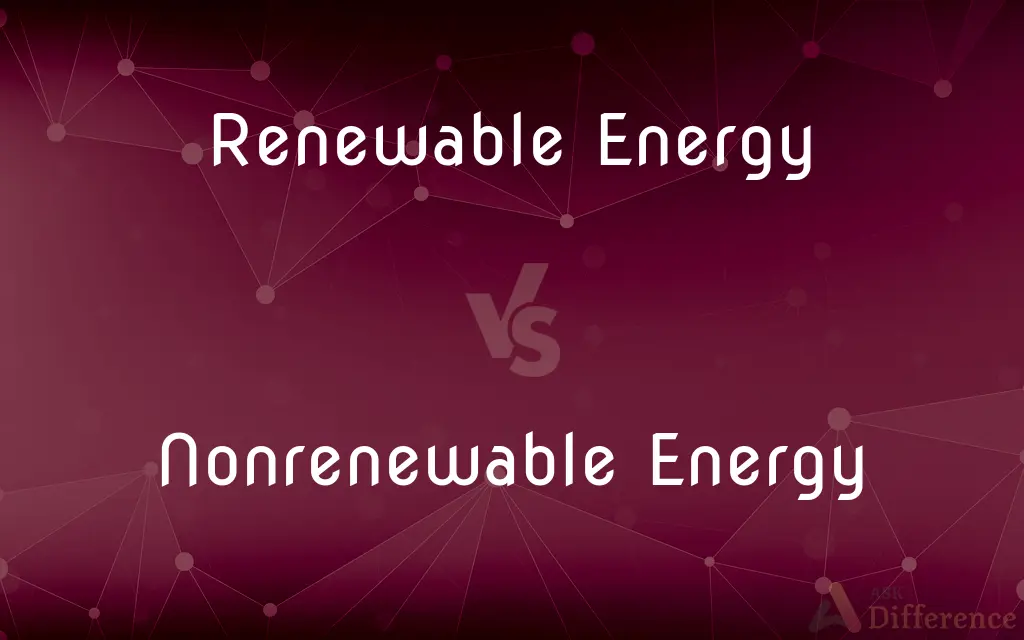Renewable Energy vs. Nonrenewable Energy — What's the Difference?
By Tayyaba Rehman — Published on November 26, 2023
Renewable Energy derives from inexhaustible sources (e.g., wind, solar), while Nonrenewable Energy comes from finite sources (e.g., coal, oil).

Difference Between Renewable Energy and Nonrenewable Energy
Table of Contents
ADVERTISEMENT
Key Differences
Renewable Energy encompasses energy sources that are naturally replenishing and virtually inexhaustible, such as sunlight, wind, and geothermal heat. Nonrenewable Energy, conversely, derives from sources that can be depleted, like coal, oil, and natural gas, providing a finite energy supply.
In the context of environmental impact, Renewable Energy typically poses less harm, emitting fewer pollutants and contributing less to climate change. Nonrenewable Energy sources, however, often generate significant pollution and greenhouse gas emissions, intensifying environmental challenges.
Economically, Renewable Energy technologies can offer substantial benefits, reducing dependence on imported fuels and stabilizing energy prices. In contrast, Nonrenewable Energy resources, being finite, are subjected to market fluctuations and geopolitical tensions, often influencing global economies significantly.
From a sustainability standpoint, Renewable Energy presents a long-term energy solution, aligning with global efforts toward sustainability and environmental conservation. Nonrenewable Energy, with its limited availability and environmental repercussions, contrasts with sustainable development objectives.
While the technology for harvesting Renewable Energy has advanced significantly, offering more efficient and viable energy solutions, it often requires substantial upfront investments. Nonrenewable Energy technologies are generally well-established but may entail lower initial costs and different technical challenges.
ADVERTISEMENT
Comparison Chart
Source Availability
Virtually inexhaustible
Finite and depletable
Environmental Impact
Generally lower
Typically higher
Economic Influence
Can stabilize prices and enhance security
Subject to market and geopolitical factors
Sustainability
Aligned with global sustainability
Not sustainable in the long-term
Technological Demand
Can require substantial initial investment
Technologically mature but may be less clean
Compare with Definitions
Renewable Energy
It's inherently sustainable in not depleting available resources.
Wind turbines convert Renewable Energy into electricity.
Nonrenewable Energy
Nonrenewable Energy originates from finite and depleting sources.
Coal-fired power plants utilize Nonrenewable Energy.
Renewable Energy
Renewable Energy typically has reduced environmental impacts.
Using Renewable Energy, like hydroelectric power, diminishes greenhouse gas emissions.
Nonrenewable Energy
Nonrenewable Energy sources can be subject to geopolitical tensions.
Conflicts in oil-producing regions can affect Nonrenewable Energy prices globally.
Renewable Energy
It can derive from several sources, like wind, solar, and geothermal.
Biomass is a type of Renewable Energy sourced from organic materials.
Nonrenewable Energy
Nonrenewable Energy includes fossil fuels and nuclear energy.
Natural gas, a Nonrenewable Energy source, is used for heating homes.
Renewable Energy
Renewable Energy is derived from natural sources that can regenerate.
Solar panels harness Renewable Energy from the sun.
Nonrenewable Energy
It often involves substantial emissions and environmental impacts.
Extracting Nonrenewable Energy through fracking can harm ecosystems.
Renewable Energy
Renewable Energy technologies can vary widely in form and application.
Renewable Energy from the ocean includes wave and tidal energy.
Nonrenewable Energy
It has historically dominated global energy markets.
For decades, Nonrenewable Energy like oil has powered vehicles.
Common Curiosities
Is Renewable Energy always cleaner?
Generally, yes, but some forms have minimal environmental impacts.
Can Nonrenewable Energy be made cleaner?
Technological advancements can reduce but not eliminate its environmental impacts.
Why is Nonrenewable Energy widely used?
Historically, it has been abundant, energy-dense, and technologically familiar.
What are common sources of Renewable Energy?
Solar, wind, and geothermal are prevalent sources.
What drives demand for Nonrenewable Energy?
Factors like industrialization, transportation needs, and economic growth.
Can Renewable Energy infrastructure be expensive?
Yes, initial investments in technology and systems can be substantial.
Are Nonrenewable Energy resources equally distributed globally?
No, some regions have more abundant Nonrenewable Energy resources than others.
Can Renewable Energy meet global energy demands?
Potentially, with technological advancements and widespread adoption.
How does Nonrenewable Energy impact climate change?
It often releases greenhouse gases, contributing to global warming.
How does Nonrenewable Energy affect political relations?
It can create dependencies and influence geopolitical dynamics and conflicts.
What are barriers to Renewable Energy adoption?
Factors like initial costs, technology, and infrastructure can be barriers.
How does Renewable Energy affect job markets?
It can create jobs in sectors like manufacturing, installation, and maintenance.
Can Renewable Energy and Nonrenewable Energy coexist in energy systems?
Yes, hybrid systems utilizing both can be implemented, often to ensure reliability and transition.
Is Renewable Energy reliable?
With advancements and smart grids, reliability is improving but can be variable.
What are the economic implications of Nonrenewable Energy depletion?
It could drive energy prices up and stimulate shifts toward alternative energies.
Share Your Discovery

Previous Comparison
Feet vs. Square Feet
Next Comparison
Taenia Solium vs. Taenia SaginataAuthor Spotlight
Written by
Tayyaba RehmanTayyaba Rehman is a distinguished writer, currently serving as a primary contributor to askdifference.com. As a researcher in semantics and etymology, Tayyaba's passion for the complexity of languages and their distinctions has found a perfect home on the platform. Tayyaba delves into the intricacies of language, distinguishing between commonly confused words and phrases, thereby providing clarity for readers worldwide.
















































